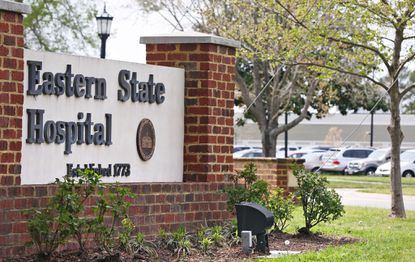As state mental hospitals struggle, lawmakers eye the agency overseeing them
Virginia’s state-run psychiatric hospitals have been in crisis mode for years. But the last nine months have brought a series of new emergencies, from the July decision to temporarily close to new admissions to a recent lawsuit against the state for failing to admit a juvenile patient going through a mental health crisis.
The turmoil has brought renewed scrutiny to the agency charged with running the facilities. Legislation filed this year by Sen. Siobhan Dunnavant, R-Henrico, proposed removing the state’s nine hospitals from under the authority of the Department of Behavioral Health and Developmental Services and establishing an independent body to oversee them.
The bill didn’t pass, but legislators did add budget language directing Virginia Secretary of Health and Human Resources John Littel to convene a workgroup focused on potential restructuring. While the final budget agreement is still being debated, the language — if included — specifically tasks the group with evaluating whether certain services should be shifted to another state agency, or if hospitals should be managed under a different model or structure.
It’s not the first time that a Virginia lawmaker has suggested changing the model for state-run psychiatric hospitals. More than a decade ago, then-Gov. Tim Kaine proposed closing and potentially privatizing several state facilities, including Virginia’s only publicly run mental hospital for children and adolescents. Dunnavant amended her bill to leave the model open-ended, but her original legislation proposed creating a hospital authority operated by a chief executive officer and board of directors.
In a committee hearing on the bill, Sen. Janet Howell, D-Fairfax, said shifting the facilities from state control would be a “precipitous” change for Virginia, which founded the nation’s first public institution for patients with mental illness in 1773. But proponents argue that state oversight has compounded problems at the hospitals, making it harder for them to respond to challenges in a timely way.
Dunnavant pointed to severe understaffing that prompted former DBHDS Commissioner Alison Land to halt new admissions at five state facilities last July. The agency had spent months warning lawmakers that burnout and low pay, combined with the ongoing COVID-19 pandemic, were driving employees out of the field. At the time, salaries for direct care staff started at $11 an hour, and most hospitals were operating at 100 percent of their patient capacity with around 65 to 70 percent of the needed staff.
Land was able to divert some emergency funding to hire contract workers and offer bonuses to remaining staff. But the agency had to wait another month for the General Assembly to allocate federal rescue dollars toward more permanent pay increases. Even now, it’s unclear how much state funding will be directed to further raise salaries and whether it will be enough to recruit more workers to the facilities.
“For these hospitals to be accountable to the process of state appropriations — that’s an almost insurmountable challenge,” Dunnavant said. Keeping them under DBHDS authority is another concern.
Problems within Virginia’s mental health system have spanned decades. According to a 2014 policy paper by Mira Signer — now a chief deputy commissioner for DBHDS — the U.S. Department of Justice began investigating state-run hospitals in the 1990s for inadequate care that, in some cases, led to patient deaths. The department pushed the state to deinstitutionalize, leading to a more than 600-bed reduction at state facilities over an eight-year period.
Virginia’s investment in community mental health services, though, didn’t keep pace with the reduction in beds. Deeds described funding as a yo-yo, pointing to the 2007 Virginia Tech shooting as an example.
While the House and Senate have yet to come to an agreement, both chambers are suggesting around $50.5 million to fund the final three services in STEP-VA, a statewide program intended to ensure that each of the state’s community service boards offer the same options for mental health treatment. In late 2021, Virginia also expanded Medicaid coverage to six new behavioral health services, and both budget proposals include at least a one-year increase in reimbursement rates to providers.
“Prudence dictates that we’d want to circle back around to the first few services to ensure the original funding is still adequate,” said Jennifer Faison, executive director of the Virginia Association of Community Service Boards. One of the very first steps requires the agencies to offer same-day assessments. But Mendez said one of her recent clients approached his local board for a substance use assessment and was told he couldn’t be seen until June.
“There’s this history in Virginia of being unwilling to make a real investment,” she said. “So even fully funding STEP-VA is going to leave us well short of where we need to be.”
(Editor’s Note: This article was published with permission by the Virginia Mercury.)


